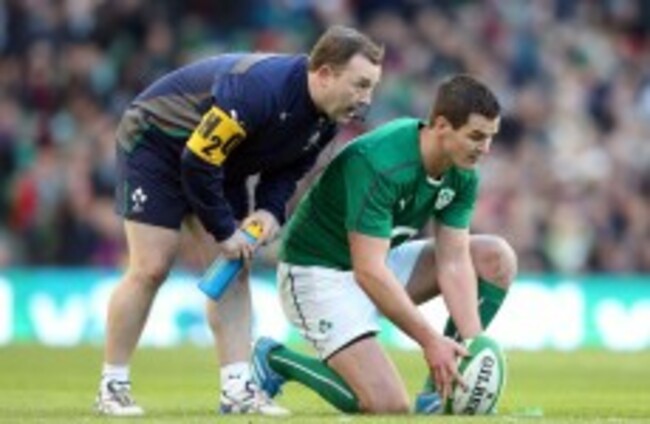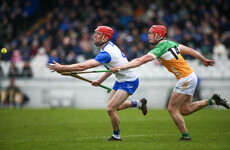JAMIE HEASLIP WAS awarded man-of-the-match, and Peter O’Mahony made a lot of the big plays, but Sexton was Ireland’s most important player against Scotland.
Maybe it’s because he isn’t on our televisions every week anymore, but the quality of his performance was a real jolt to the system.
In the subsequent analysis it was deemed a certainty that, either way, the team would have eventually found their rhythm, but that’s not necessarily the case. Ireland went back to playing with structure in the second half, but the goodness only flowed after his break.
This game had all the hallmarks of a typical Ireland-Scotland game in which Ireland fail to fight the fight on their terms. It still required that kickstart from Sexton to get brains and bodies flowing with adrenaline. There have been plenty of Six (and Five) Nations games against the Scots where that spark has never arrived and they go on to take a messy victory.
The crowd had been pitifully quiet up to that point too and were clearly waiting for a moment they could relate to but from the 38th minute onwards the levels of engagement were transformed. Maybe it’s too much of a leap to say it helped his teammates too, but it was noticeable how much the players relaxed and fell back on muscle memory once he made that break.
Composure
It’s worth analysing the different components required to make something like that happen. The instinct to sense defensive cover was coming up on the outside, vision to spot the gap, footwork to beat the first man, acceleration to beat the second, power to ride the half tackle, top-line speed to get away from centres and backrowers, composure when in space to weigh up his options, and skill and core strength to throw an inch perfect 20 foot pass while running at top speed.
The message Sexton rammed home is that at international level, more so than in the Heineken or Rabo, you need your brilliant players doing amazing things. The great line breaks and offloads don’t always need to end in scores either. It’s the message it sends to your opponent, and the space it creates in later moves. Sexton was heavily marked after that, leaving more space in midfield for his teammates for the remainder of the game.
Ireland’s Rob Kearney, Brian O’Driscoll and Jonathan Sexton. Pic: INPHO/Dan Sheridan
Whenever Sexton’s talent is discussed, the main question mark that crops up is would you prefer Ronan O’Gara or Sexton taking a last-minute drop goal or penalty to win a game? The answer is probably O’Gara. He was the the best clutch player we’ve ever had. That’s not the whole argument though. No player is perfect, and Sexton ticks just about every other box.
The lowest moment of his career so far is that penalty miss against New Zealand. It’s not often a player gets to cradle 108 years of sporting history in his hands, and that will continue to define perceptions of him for a while yet.
Part of the problem is Sexton has been the starting outhalf in a non vintage era, results wise, for the national side. It’s maybe forgotten now that Ireland almost lost the 2009 Grand Slam because of O’Gara’s wayward penalties against England.
More than any other team in the Six Nations, Wales are reliant on their superstars doing something extraordinary. Ireland could conceivably be on a clean sweep over them since 2005 were it not for Shane Williams in 2008, Mike Phillips in 2011, Jonathan Davies in RWC 2011 and George North in 2012. That’s a lot of ifs, but all those games were winnable (the quarter-final game was 10-10 in second half), were it not for some special plays. Warren Gatland creates the environment to let those players rip.
Under Schmidt, Sexton should at least get opportunities to create special moments. He’s dominated three Heineken Cup finals and is one of the most decorated players in Europe but until he is responsible for closing out a game for his country, there will always be a few doubters.












This article is comical. Sexton was the most important player on Sunday? A clean sweep, apart from those 4 times we lost? Simon Hick, you’re no Murray Kinsella.
That’s what top players are for, a possible clean sweep but for north, Williams, Philips, Davies!! That’s a poor poor argument, how many times have we beaten teams with moments of class from o Driscoll, o gara and bowe, quiet a few I’d imagine! And by the way, in that game you spoke of v England, o gara nailed the important one.
O gara was dreadful in that game and there were others as sexton can n will be. They are human after all,
In Sexton’s *second* cap he won man of the match with a 100% kicking performance that secured a 15-12 win over the Boks. To say he needs to close out a tight game at some stage sounds like a false narrative. He’s been first choice ten in a mostly spluttering Ireland team – but he started the Oz game at the last World Cup, when we were excellent (albeit mostly forward-based stuff in the rain – but still very much a tight affair where his kicking was crucial) before looking like a vacuum of ideas against Wales (when Rog started).
I think they’re both top quality players but if we had a peak O’Gara at the minute there’s no way I’d pick him ahead of JS, who is a better all round player.
Rugby’s a team game and unfortunately we’ve not had a great team for the past few years, for various reasons. I’m pretty happy with out out half though.
Having checked, it was 15-10 and he missed one… you all get the drift.
A off peak o Gara would have killed off the all blacks
Agreed. Johnny is a vastly superior player. We now have a 10 who can pass, run, kick and tackle and is not seen as a turnstyle by the opposition. This is reflected in Johnny being a Lions test winner whereas ROG played second fiddle to a Welsh journeyman and was in fact ridiculed by Lions supporters after his cameo of the bench in the deciding test in 2009. I have no doubt that had the Irish ‘Golden Generation’ a 10 of Johnny’s quality, more than the one championship/grand slam would have been secured.
Johnny being a Lions test winning out half – albeit with a metronomic full back taking the kicks (and pressure that goes with it) off of him, and against a pretty poor Aussie team by their standards. Fixed that there for you. Nobody argues that Sexton is the best 10 available to Ireland and that he can do things in both defence and attack that ROG never could in a million years. He’s potentially the best 10 Ireland have ever had. But there will always be a doubt if he can transfer his Leinster form to the Ireland shirt and win games for Ireland at the death the way ROG did. There’s no provincial bias nonsense in stating that cold fact. Best of luck to him and Ireland on Saturday.
You know he has played them before? He didnt kill them off either, comical comment. I have a lot of respect for what he did as a player, moreso since the special on him recently on tv but jesus stop making me look like I dont rate him by having to respond to idiotic comments like this
Responding to dermot
If the rog documentary affected your view of the man you didn’t know much ,and my comment was passed just to bring some folk back to earth waffling about johnny Sexton a better no 10 than ROG ,simle as that kid
Thats why I said moreso since the documentary. I knew plenty about his rugby achievements, it was the personnel side to him I didnt know about hence the added respect for the man. my original point stands, youre just stirring sh1te or know very little about rugby posting disinformation like you did
Maybe we won’t need to win games at the death with Johnny playing. Not to take away from ROG.
Are you sure this article wasn’t made for Waterford whispers? Had a great laugh the hole way through